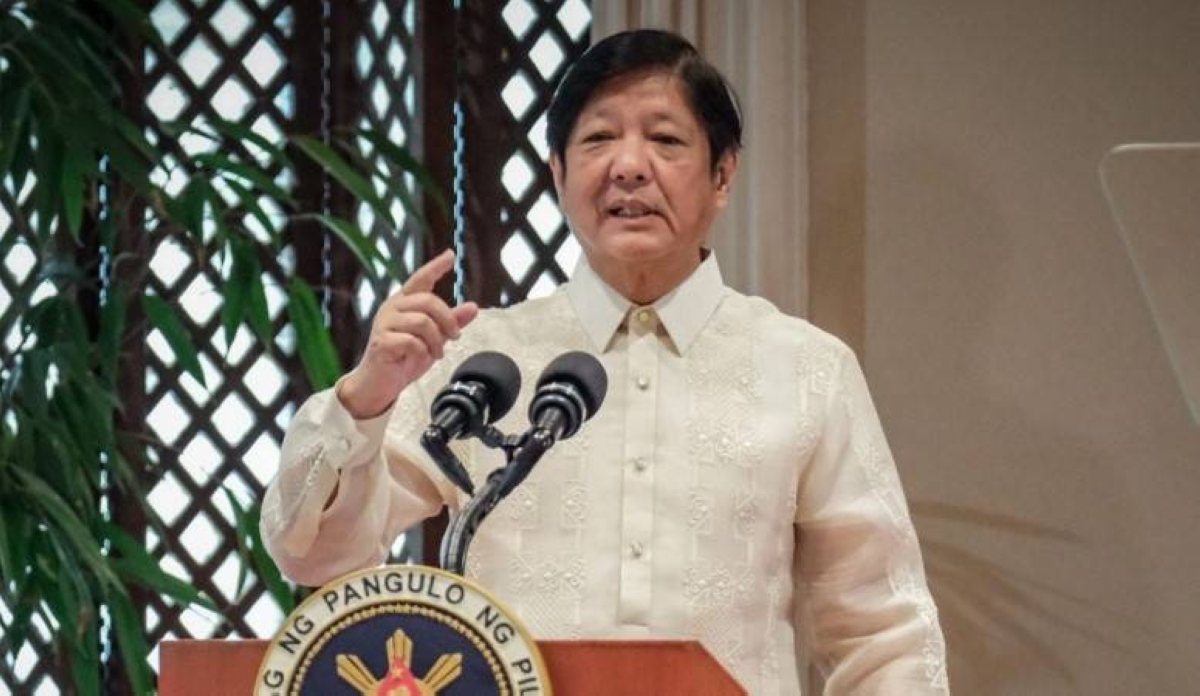Read this in The Manila Times digital edition.
(UPDATE) PRESIDENT Ferdinand Marcos Jr. on Thursday said the Philippines has taken the “first step” toward a federal form of government that would make the country’s political structure “more stable.”
In his speech during the oath-taking ceremony of new members of his political party, Partido Federal ng Pilipinas (PFP) in Malaca?ang, the President said the seemingly federal setup will continue by bringing more power centers to other parts of the country.
President Ferdinand R. Marcos Jr. on Thursday urged the newly-sworn in members of the Partido Federal ng Pilipinas (PFP) to uphold the ideology of the party in empowering local government units as decision-makers through the concept of federal governance. Photo from PCO
“That is very simple. That derives from a very simple idea that the stability of a political structure is much more reliable when we have many power centers. If the power centers only belong here in Manila, then pabagsakin mo ‘yung Manila, bagsak ang buong Pilipinas (if Manila falls, the entire Philippines would fall),” Marcos told his party mates.
“But with the power centers being given to the local governments, to the local districts, and to those operating at the local level and thereby bringing those power centers to many, many places, it makes for a more stable political structure and makes a more stable political life,” he said.
Marcos also said decision-making in government should be made at the lowest level possible, saying that governors and congressmen should be allowed to decide since they know the situation on the ground.
delivered to your inbox
“What we are talking about here is federalism, and what we have started to do, kahit (even) in all but name, ang ginagawa ay talagang ibinibigay ang discretion, ang power, ang function, hangga’t maaari, sa pinakamababa na level na maari nating gawin. So we are doing the first step of the federal government for the Philippines, in all but name,” he said.
“There has to be a central tenet and central principle to what we are doing. And we are talking here about federalism. What we have started to do, in all but name, ang ating ginagawa ay talagang ibinibigay ang discretion, ang power, ang function, hangga’t maaari sa pinakamababang level na maaari nating gawin (is really give the discretion, the power, the function, as much as possible, to the lowest level as much as we can),” he said.
The Philippines has a unitary form of government, with “imperial” Manila as the seat of power and authority.
Under a federal government, power is divided between the central government and local state governments.
A federal system also allows each state to craft its own laws, finances, development plans, health, education and infrastructure.
“With the power centers being given to the local governments, to the local districts and to those who are operating at the local level, and thereby bringing those power centers to many, many places, it makes for a more stable political structure and makes for more stable political life,” Marcos said.
Federalism became a buzzword in 2016 when Rodrigo Duterte, then the mayor of Davao City, highlighted it as a campaign promise. Duterte eventually gave up on the idea years later.
Unlike Duterte, who was “very clear” about pushing federalism forward during his 2016 presidential campaign, Marcos was not overly enthusiastic about it, despite running under a pro-federalism party in the 2022 elections.
In January last year, Marcos said that a federal system of government suits the Philippines, but changing the 1987 Constitution to achieve it may not be easy.
The following month, he said Charter change was not among his priorities after some lawmakers pushed to amend the Constitution to ease what they called “restrictive” economic provisions.
Marcos said the goals of those seeking to change the Constitution to allow for more foreign investments can be met without tweaking the fundamental law.
“We can achieve what we want, but within the present constitutional [framework], the way the Constitution is written,” the President has said.
Changes in the Constitution have been espoused by every administration after President Corazon Aquino, including a shift to a parliamentary form of government.
None of them have gained traction, mainly due to insinuations that government officials were trying to perpetuate themselves in power.

















